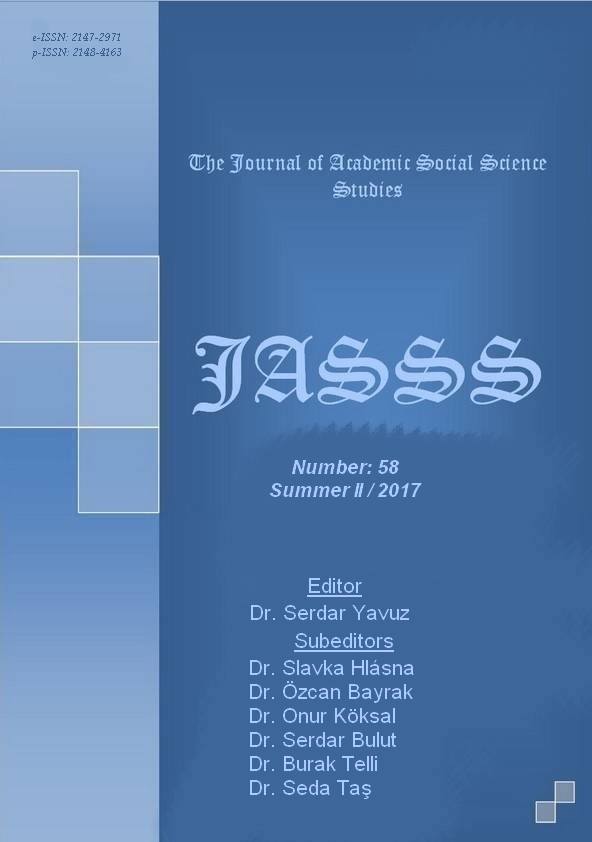YUSUF AKÇURA’NIN “ÜÇ TARZ-I SİYASET” ADLI ESERİNİN TÜRK SİYASAL HAYATINA YANSIMALARI:MİLLİYETÇİ HAREKET PARTİSİ ÖRNEĞİ
Author :
Abstract
Yusuf Akçura, “Üç Tarz-ı Siyaset” isimli ünlü eserini Kazan’da yazmasına rağmen, Sovyet idaresinden çekindiği için, 1904 yılında Kahire’de çıkan Türk Gazetesi’nde yayımladı. Akçura’nın makalesinde üzerinde durduğu üç temel husus şunlar olmuştur: 1- Bir Osmanlı ulusu meydana getirmek yani “Osmanlıcılık”. 2- İslamcılığa dayanan bir devlet yapısı kurmak yani “İslamcılık”. 3- Türk siyasal ulusçuluğu meydana getirmek yani “Türkçülük”. Osmanlıcılık, İslamcılık ve Türkçülük görüşlerinin karşılıklı olarak mukayesesini ilk defa Yusuf Akçura yaparken; Osmanlıcılık, İslamcılık ve Türkçülük fikirlerini tahlil ediyor ve sonuçta en uygun siyaset tarzının “Türkçülük” olduğu vurguluyordu. Eski Hristiyan tebaa ile yaşanan 1912 Balkan Harbi neticesinde Osmanlıcılık, I. Dünya Savaşı’nda Osmanlı Sultanının Halife sıfatıyla ‘cihad’ ilanına rağmen ortaya çıkan Arap isyanlar ile de İslamcılık fiiliyatta anlamlarını yitirmiş idi. “Türkçülük” ise neredeyse tek alternatif gibi kaldı. İttihâd ve Terakki’yi ve müteakiben Atatürk’ün de benimsediği bu fikir akımı doğrultusunda; Atatürk’ün ‘Millet’ tanımı da Yusuf Akçura’nın tanımı ile uyuşmakta idi. Nitekim, Atatürk: “Millet, dil, kültür ve mefkûre birliği ile birbirine bağlı vatandaşların teşkil ettiği bir siyasi ve ictimai heyettir.” derken, Yusuf Akçura’nın millet tarifinde dini birlik aranmadığı gibi, ana unsurun ırk ve dil olduğu, bu tanımlada Atatürk’ün görüşüne paralellik olduğu görülmektedir. Yusuf Akçura’nın Türk Siyasal hayatındaki yansımaları Atatürk sonrası dönemde geri planda kalmış ise de, Alparslan Türkeş’in 1963 yılında kurduğu “Huzur ve Yükseliş Derneği” tüzüğünde yeniden gün yüzüne çıkmıştır. Nitekim, 1965 yılında Cumhuriyetçi Köylü Millet Partisi ve ardından da 1969’da Milliyetçi Hareket Partisi’nde yansımaları görülen Yusuf Akçura’nın fikirlerinin günümüzde Türk siyasetindeki en büyük temsilcisi olması nedeniyle bu makalede; Milliyetçi Hareket Partisi örneklem alma modeliyle incelenerek, siyaset sosyolojisi açısından ve tarihsel bir perspektif ile değerlendirilerek, bir asrı aşkın bir süredir Türk siyasetinde yer alan ‘Türkçülük’ fikir akımının yansımaları ifade edilmeye çalışılacaktır.
Keywords
Abstract
Yusuf Akçura, published his famous work entitled as: “Üç Tarz-ı Siyaset” (Three Genres of Politics) in the Newspaper called “Türk” in Cairo at the year 1904. He wrote this article in Kazan but he was attracted by the Soviet Governance so he did not published it there. Three main points that pointed out in Akçura’s article are as follows: 1- Building an Ottoman Nation that means: "Ottomanism". 2- To establish a state structure based on Islamism, named as: "Islamism". 3- To bring the Turkish political nationalism to the scene, named as: "Turkism". Yusuf Akçura, made the first mutual comparison of Ottomanism, Islamism and Turkism. He analyzed the ideas of Ottomanism, Islamism and Turkism and stressed that the most appropriate style of politics was "Turkism". Ottomanism ended in the wake of the 1912 Balkan War that lived with the ancient Christian people. Islamicism lost its meaning in Arabic rebellions despite the declaration of 'jihad' by the Ottoman Sultan in the name of the Caliph of World War I. "Turkism" almost remained the only alternative. The idea of the İttihad and Terakki, and also the idea that Atatürk has adopted, Atatürk's definition of 'nation' was consistent with Yusuf Akçura's definition. Atatürk adressed as: "The nation is a political and social committee formed by the people who are connected to each other by the language, culture and ethnic unity.” Also Yusuf Akçura’s description for the Nation does not seek religious unity, it is seen that the main element is the race and language as parallel to the Atatürk's view. Although the reflections of Yusuf Akçura in Turkish political life are regressed in the post-Ataturk period, Akçura’s ideas re-emerged in the statute of the "Peace and Rise Association" that was established by Alparslan Türkeş in 1963. The Republican Peasant National Party in 1965 and then the Nationalist Action Party in 1969 reflects the effects of Yusuf Akçura's ideas in their party programs. Today, in the Turkish political life, as the Nationalist Action Party is the greatest representative of those ideas, was examined by sampling model. In terms of political sociology and evaluated from a historical perspective, reflections of the 'Turkism' idea Action in Turkish political life will be tried to be expressed in this paper.
